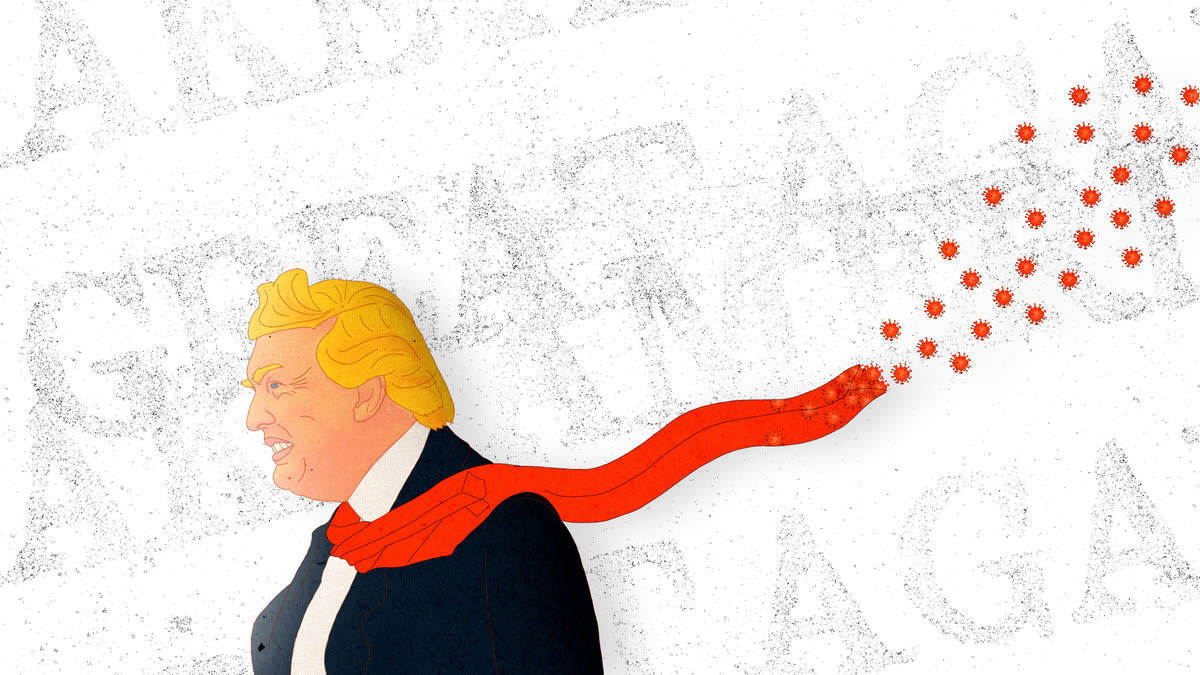Having left Walter Reed hospital after a three-day stint recovering from the coronavirus, President Donald Trump began, what aides and confidants say is, a new phase of the presidential campaign: an effort to turn his illness into an electoral asset.
The president’s stint in the Military Medical Center may have raised serious questions about his political future and his physical status, with doctors giving him a trio of therapeutics and his physician acknowledging that he is not yet out of the woods. But during his time away from the White House, Trump spent his weekend frantically working the phones, compulsively watching TV, and flagrantly disregarding the advice of his own public health officials.
“How is it playing?” the president quizzed several advisers and senior aides since Friday, polling them on their thoughts on how his diagnosis was being covered in the press.
He also was scheming. And at the top of his mind, according to three people with knowledge of his private comments, was how to reverse the damage that his campaign may be enduring by him being off the trail. Trump assured confidants that he would be back soon, though he wasn’t sure if he could commit to doing so in the coming week. And he previewed what is set to become the latest of many 2020 messaging reboots in the past few months.
The president repeatedly claimed that once he recovers from the coronavirus—for which first lady Melania Trump, his campaign manager, debate sparing partner, press secretary, and other aides also tested positive—he’ll be able to present himself as a conqueror of it, both personally and politically.
The notion might seem far-fetched, considering the poor marks Trump’s received for his handling of the pandemic. But according to the knowledgeable sources, the president insisted that this would be a campaign asset, as he’d be able to say “I know what people are going through,” one of the sources recounted him saying. Allies argued that this could help frame Trump as both resilient and empathetic, which could come in handy in a race where polling shows a wide empathy gap between him and former Vice President Joe Biden.
“He’s become sort of a first responder. He has lived through it and been in the hospital,” Newt Gingrich, a former Republican House speaker and an informal adviser to Trump, said in an interview on Monday. “And he’s fearless. We are not the land of the timid and the home of the scaredy cats.”
By Monday morning, Trump’s campaign had begun test driving this newest 2020 sales pitch, brushing aside the reality that the president’s stubborn flouting of public-health and safety measures had directly contributed to his own infection, not to mention the deaths of 208,000 Americans. Indeed when he arrived back at the White House on Monday night, Trump walked onto the balcony for a photo op, during which he defiantly tore off the mask he was wearing, the heaviness of his breaths making clear that the disease was very much still in his system.
Earlier in the day, Dr. Sean Conley, Trump’s physician, had gently warned that he may “not entirely be out of the woods yet.” But in a video he recorded, Trump insisted that he could have left the hospital two days ago because he “felt great.”
His voice raspy, his mask still off, the lingering fragments of the fall sunset behind him, he added: “Maybe immune. I don’t know.”
It was a surreal scene that fit neatly into the surreal moment: a president with unclear health status, risking the safety of his own aides and security detail for the purposes of putting on a good face for the election less than 30 days away. And, for the most part, everyone in Trumpland seems happy to play along. In addition to the attempt to turn the president’s serious COVID infection into an electoral asset, Trump’s campaign has also tried to turn it into a cash cow.
“As the leader of the free world, President Trump had no choice,” declared a fundraising email sent on Monday morning by a joint fundraising committee for the Trump campaign and the Republican National Committee. “He didn’t want to stay in the White House and lock himself in, away from the American People.”
That email was one of at least a dozen sent by the Trump re-elect since Saturday urging supporters to donate to the campaign or sign ostensible “get well” cards for the president. Those appeals mirrored the president’s burning desire to get back on the campaign trail.
“We are in the final stretch of this Election,” declared an email sent on Sunday under the name of the president’s son, Donald Trump Jr., “and while my father is working hard to get back on the road as quickly as possible, it’s up to us to keep our movement strong for his EPIC RETURN.”
But while some of the president’s top allies were laying the groundwork for a glorious recovery, hyping in occasionally comical terms the president’s impending convalescence and return to the campaign trail, others in the Trump orbit weren’t quite as bullish on the idea that the president’s contraction of the coronavirus would make him look like an electable tough guy.
“Obviously the jury is out on the political consequences,” said Matt Schlapp, the American Conservative Union chairman and a prominent Trump surrogate. “[But] I don’t think this idea is going to sell, to say somehow the president did something wrong and that’s how he got sick. Blaming those who have gotten sick is a huge mistake… There are a lot of people in this country who get that and reject the narrative that Trump has done something wrong and that’s resulted in him getting this.”
Recent public polling shows more Americans than not accept the premise that Trump’s own personal approach to the global pandemic—not to mention his policies or his insistence on having large crowds at his rallies—helped lead directly to this current moment. But beyond President Trump’s own health, much of the country’s outlook on the pandemic has been far apart from the rosy picture the White House has tried to paint. With the death toll continuing to climb and the economy remaining in a rut, progress combating the disease has stalled out.
“I’m actually disturbed and concerned about the fact that our baseline of infections is still stuck at 40,000 cases a day,” Dr. Anthony Fauci, a leading figure on the White House task force, told CNN on Monday. “That's no place to be."
And yet, there is scant evidence that the president or his team are ready to course-correct. Instead, much of the energy and angst inside the administration has been over how the pandemic—and Trump’s infection—have been handled from a public relations standpoint. Over the weekend, various senior officials in the White House and on the Trump campaign independently vented to The Daily Beast about the mixed messages coming out about the president’s situation, and rampant dysfunction within—with several laying the blame squarely at White House Chief of Staff Mark Meadows’s feet.
“[Basically] no one was being told which way was up and which way was down,” one White House official said. “Many of us had to find out what was going on by reading the news.”
Some in the president’s inner circle, meanwhile, didn’t even seem worried enough by the news to start fully accepting stricter precautions. Rudy Giuliani, Trump’s personal lawyer who flew on Air Force One to the Biden-Trump debate last week, claimed via text message on Saturday that he tested negative. But when asked if he planned to quarantine just to be safe, he replied that he was only doing so “informally,” and was still considering “go[ing] to a friend[’s] house for dinner” that evening.



